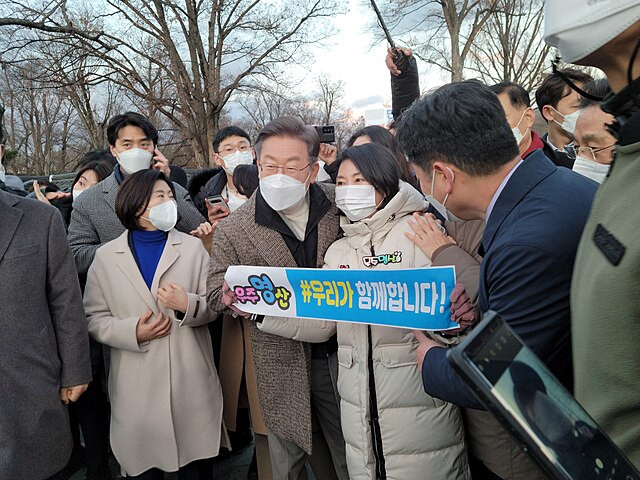In a shocking incident that has sent ripples through South Korean politics, Lee Jae-myung, the leader of the opposition Democratic Party and a former presidential candidate, was stabbed in the neck during a public appearance in the port city of Busan. The attack, which occurred as Lee was touring a proposed airport site, has prompted a swift condemnation from President Yoon Suk Yeol and raised concerns about the safety of public figures in a nation where political violence, though rare, has a disturbing history.
Lee, who narrowly lost the 2022 presidential race to the conservative Yoon, was approached by an unidentified assailant masquerading as a supporter seeking an autograph. The attacker, described as a man in his 50s or 60s and wearing a paper crown adorned with Lee's name, lunged at the opposition leader with a sharp object, leaving a 1 cm gash on his neck. Graphic video footage and photographs from the scene show Lee grimacing in pain and collapsing to the ground, with bystanders rushing to his aid and pressing a handkerchief against his wound.
South Korean opposition leader Lee Jae-myung was just stabbed in the neck while speaking to a crowd. pic.twitter.com/hK2m5lnvqp — Ian Miles Cheong (@stillgray) January 2, 2024
Following the attack, President Yoon swiftly condemned the violence, describing it as "an unacceptable act." He expressed his deep concern for Lee's well-being and instructed that the best possible care be provided for a speedy recovery. Lee, who served as the governor of Gyeonggi province before his bid for the presidency, was transported to a local university hospital and is reported to be conscious.
The incident has not only shocked the nation but also brought back memories of past attacks on political figures in South Korea. Despite strict gun control laws, the country has witnessed assaults involving other weapons. Notably, Lee's predecessor, Song Young-gil, suffered a head laceration in 2022, and Park Geun-hye, a former opposition leader who later became president, was attacked with a knife in 2006, sustaining a facial injury that required surgery.
As Lee stands trial for alleged bribery related to a development project during his tenure as the mayor of Seongnam, his leadership of the main opposition party since August 2022 and the upcoming parliamentary elections in April have placed him in the political spotlight. The incident raises questions about the safety measures in place for public officials and the underlying tensions in a politically divided nation.
This brazen attack not only underscores the vulnerability of public figures but also serves as a stark reminder of the urgent need for comprehensive security strategies and a broader dialogue on political civility and respect. As South Korea grapples with this unsettling event, the focus now turns to ensuring the safety of its leaders and reinforcing the democratic values that underpin its society.




